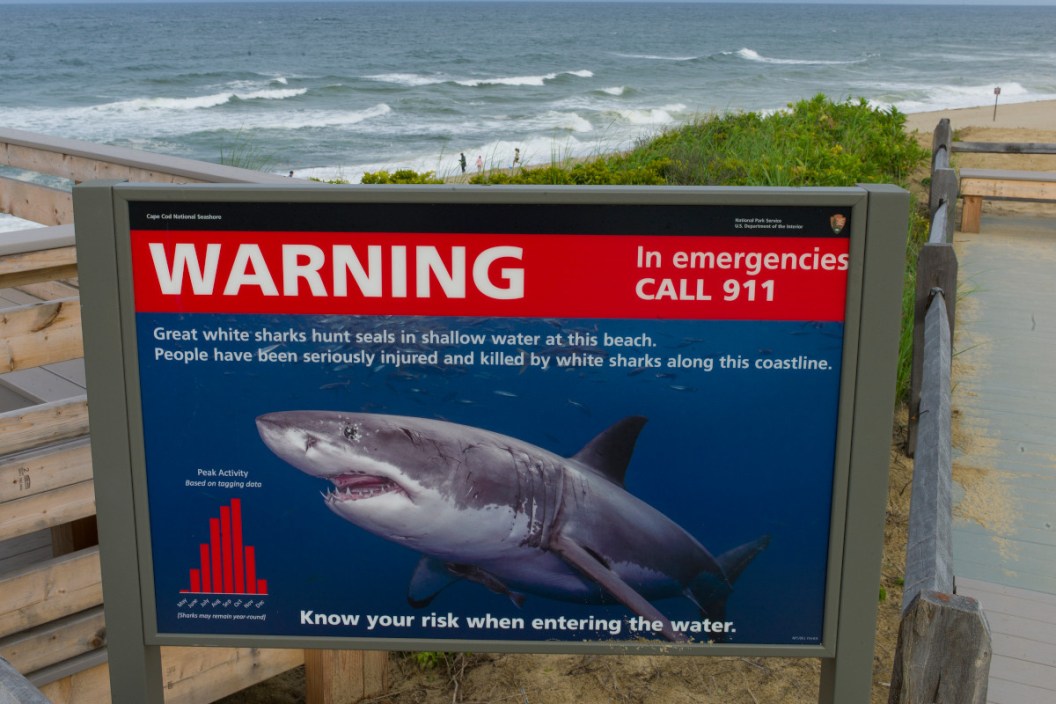The tail was swishing back in forth approximately ten to fifteen yards in front of me. The shark had its head down to the seafloor, apparently investigating or eating something on the bottom. I was snorkeling in approximately eight feet of water in western Puerto Rico. I had just made my way around a large stack of coral that jutted up from the sea floor like a mountain, admiring all the colorful fish that darted in and out of the crevices in the colorful reef. The fact that I was even in the water was a victory. It had taken me years to enter the ocean due to a petrifying fear of sharks that originated from seeing Jaws as a child.
So, it was just my luck that the first time I went snorkeling ever, I spotted a shark. I didn't get a good look at it, but after reviewing my GoPro footage, it appeared to be a nurse shark, maybe four to five feet long at most. Certainly not a dangerous species, but I wasn't going to stick around to find out. I immediately paddled in the opposite direction, and never saw it again.
Many people share my fears about these predators of the deep, even though the odds of being attacked are astronomical. In fact, most experts estimate you're more likely to drown or get killed in a car accident than by a shark.
Even if the odds are low, it certainly does not hurt to know what to do in case you find yourself in that unfortunate position someday. Today we're going to examine what the experts say you should do if you find yourself being attacked, and the best ways to avoid an unwanted encounter in the first place.
What is the best way to avoid a shark attack?

Getty Images: cdascher
Depending on the source, most experts estimate the odds of being attacked by a shark somewhere in the range of 1 in 3.7 million to 1 in 7 million. Frankly, your odds of suffering a shark bite are extremely rare. CBS News reports the average number of bites in a year has hovered around only 72 worldwide. Many of these bites by larger great white sharks and tiger sharks are thought to be cases of mistaken identity by the animal. This seems to happen most often with surfers, who have a profile that resembles a seal or sea lions when sitting on their boards waiting for the next wave. As Popular Science notes, these apex predators will usually let go quickly once they realize a human isn't their natural prey.
Swimmers and surfers can reduce the odds of attack to near zero by following some simple precautions. The Florida Fish and Wildlife Conservation Commission recommends avoiding the water during shark feeding times. These are normally the hours between dusk and dawn. You should also avoid drop-offs and particularly murky waters.
Shark experts also recommend staying away from a subsurface discharge for sewage or other water in the ocean. Places where fishermen frequent are also good spots to avoid because they can draw baitfish, which in turn draw sharks. The same goes for places where you might see a commercial fishing boat. It's a good rule of thumb to avoid areas where freshwater connects to the ocean. It's been well documented that bull sharks like to sometimes enter rivers and lakes.
Swimmers should avoid jewelry that is shiny or reflective, since it can give off a sheen similar to fish scales. It's also not recommended to wear clothing or bathing suits with bright colorations, or to expose uneven tanning on your skin. This is because sharks see contrast particularly well.
The FWC also says that swimming in groups is best, and avoiding the water if you're bleeding is a good rule of thumb.
It should go without saying, but they also recommend not trying to harass a shark. Every year, some bites do happen on people who don't heed this most basic bit of advice.
What to do if attacked by a shark

Getty Images: NaluPhoto
Even if the odds of being bitten are low, it's still not a bad idea to know what to do in case you find yourself dealing with an unwanted shark encounter. Assuming you see the shark before it before it attacks, most experts recommend staying calm and slowly making your way to safety. If you're surfing that might be the beach. If you're scuba diving or snorkeling in open water, it might be a boat instead.
The International Shark Attack File kept by the Florida Museum notes some specific shark behaviors to watch for if you spot one. More specifically, if the shark swims in a zig zag pattern or moves up and down quickly, it's a sign that they could attack. In rare cases, they might just aggressively swim right at you.
If a shark is acting aggressive, experts recommend backing up against structure if possible. If you're diving and there's a reef, rocks, or other structure underwater, back into it. Experts say this reduces the number of angles from which the fish can attack. If you're in the water with a group, have everyone tread water back to back so you can keep eyes on it. Sharks aren't likely to attack a group of people. There are also stories of surfers who have used their surfboard to put a barrier between themselves and the predator to avoid a bite.
Of course, there's always the chance you won't see the bite coming. Many unprovoked shark attacks on surfers happen from below when the person is least expecting it.
Regardless of whether you see it coming or not, if a shark does happen to latch onto you, the best course of action is to fight it with everything you have. The eyes, snout, and gills are all sensitive. Punch, gouge, or kick those areas if you can to increase your chances of survival. Many people have saved their own lives with a single strategic jab to one of these areas. Hands, arms, or feet are okay, but if you have a strong-enough object on you, you should use it to strike.
If you have been bitten by a shark, get to land and seek medical attention as quickly as possible. Most recorded fatal shark attacks do not involve a person being eaten by the animal. Many people have died after being pulled from the water from blood loss or other fatal injury. The teeth of these predators are no joke and if one happens to sever an artery, it doesn't take long for a person to bleed out.
Remember that most species of sharks are not the killers they are made out to be in the movies. In fact, they're probably more afraid of you than you are of them. I'm almost certain that was the case with my encounter in Puerto Rico. By using a little common sense, most people can avoid these types of unwanted encounters with these fascinating ocean predators.
For more outdoor content from Travis Smola, be sure to follow him on Twitter and Instagram For original videos, check out his Geocaching and Outdoors with Travis YouTube channels.




